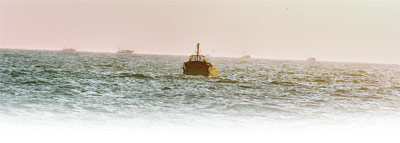News
Palk Strait may end up as a dead sea

Indian trawlers on the horizon: They come in their hundreds to rob our sea resources. Pix by Indika Handuwela
Sri Lankan naval vessels regularly patrol the International Maritime Boundary Line (IMBL) to keep the Indian fishermen away, but the exercise is turning out to be a ‘cat and mouse’ game.
“As soon as the navy boats turn away, the Indian boats return to poaching in the Sri Lankan territorial waters,” a Navy officer explained.
As part of an ‘unofficial agreement’ the Indian trawlers enter the Lankan waters on three days — Mondays, Wednesdays and Saturdays — thereby enabling the Sri Lanka fishermen to continue with their fishing in the rest of the week.
Last Monday, the Sunday Times investigators were able to witness the Indian boats streaming into Lankan waters late in the evening after they assembled just outside the IMBL earlier in the day.
‘The practice is regular. Sometimes there are more than 1,000 trawlers,” an officer explained.
“In most areas, the Navy deploys boats. But intruding fishermen find the gaps to penetrate and lay their nets. They turn back if they see the boats and if the Navy boats turn away they return,” the officer added.
The Sri Lankan Navy currently only drives away the Indian trawlers or takes action to arrest them, but most of the men have been released on the advice of the Government.
The move to release the arrested fishermen on a regular basis has disturbed local fishermen. (See box story). This is while the local fishermen face stringent penalties under newly imposed regulations.Almost all Indian boats engage in bottom trawling which is prohibited in India.
One of the concerns for the Navy also has been that it has the responsibility of taking care of the detained boats.
Poaching and the destruction to the marine life have not been the only concern as the route is used for smuggling of narcotics also. Over the last year, nearly 9,000 kg of Kerala Ganja has been detected while more than 50 kg of gold being smuggled out of the Sri Lanka has been seized.

Three years ago, to conserve fisheries resources in the State, the Government of Tamil Nadu prohibited fishing by mechanised boats and trawlers along the entire east coast of Tamil Nadu.
The ban lasts for 45 days every year, from April 15 to May 29. It is meant to coincide with the breeding season and aims at conservation and regeneration of fisheries. No trawlers are allowed to venture out to sea during this time and no fuel is issued to the trawlers.
Ironically, the ban has not brought the desired result, a Sri Lanka Navy spokesman said. The sea bed, ravaged by excessive bottom trawling, has not picked up life during the last three years.
Further, due to dredging from the Sethusamudram canal project, the sea bottom in the Indian side of the Palk Bay has further deteriorated, he said.
This makes it doubly important to protect the marine life in Sri Lankan waters from Indian bottom trawling. Otherwise, our seas will also become a “dead sea”.
| ‘We were beaten up and given rice with worms to eat’ Lankan fisherman arrested on the Indian side speaks of his ordeal Anusha Anupama, 33, from Trincomalee was among the six Sri Lankan fishermen who have undergone harsh treatment after being arrested by Indian coast guards for allegedly poaching in their waters. They were arrested by the Indian coast guard after their multi-day trawler had strayed into Indian waters. Anupama told the Sunday Times about his experience being arrested. “Soon after our arrest we were taken to their vessel and ordered to kneel on a heavy iron plate which had heated for the sun. We were beaten up by the coast guards and handcuffed. “We were offered rice with dhal and were forced to pick out the worms off the plates of rice before we ate. There were more worms than rice.. “When we wanted water we were given muddy water. I complained about this to a senior officer who intervened and provided us with bottled water. “One day they ordered me to cut fish with my handcuffs on. I refused to do so and said if they removed the handcuffs I could cut the fish. “We were eventually kept in a prison in Hyderabad for two andhalf months and were released only after they paid Rs.75,000 each while the skipper was find Rs.100,000. “We did not receive any support from the government and had to manage our affairs on our own. “Now we do not dare to stray into the waters of other countries as a vessel monitoring system is in effect and as soon as we reach international waters a warning appears and if we stray into the territorial waters of other countries the skipper’s licence is cancelled by the Fisheries Department which monitors the movement. “But, in contrast Indian fishermen are seen poaching in our waters freely and when they are arrested they are provided with the best possible treatment and released a few weeks later.“ It was only recently that some of our fishermen overpowered a group of Indian fishermen after they were attacked and brought them ashore. They were handed over to the authorities, but were released subsequently though they had committed a criminal act. “We urge the authorities to take action against the Indian fishermen who stray into our waters and destroy our fisheries resources.”
|

